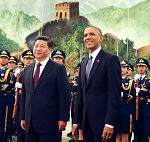On 12 November 2014, the U.S. and China announced ambitious targets to reduce greenhouse gas emissions, and to work together to overcome challenges towards reaching a global climate change agreement in Paris. Amit Bhandari, energy and environment fellow at Gateway House, comments on the impact of this development.
An additional analysis by Rajni Bakshi, Gandhi Peace Fellow at Gateway House, is available here.
Statement:
“The U.S-China agreement to combat climate change by reducing or limiting carbon emissions and increasing the share of non-fossil fuels in energy consumption highlights the intent of both countries to positively address the issue and move towards low-carbon economies.
China is among the world’s top polluters – it accounts for 27% of the world’s total carbon dioxide emissions while the share of U.S. stands at 17%. In the agreement between the two countries, China has agreed to make efforts to peak its carbon emissions by 2030, and also conveyed that it intends to increase the share of renewables in its energy pie to 20%, which are both positive outcomes. It is likely that there will be pressure on India to do the same.
However, the agreement does not make caps on carbon emissions mandatory for China, which would have been desirable. China uses coal to meet 67% of its energy needs –the share of coal is 30% in the global energy mix – so its share of pollutants other than carbon dioxide is likely to be higher. If China is free to raise its emission levels till 2030, it can offset the gains in emission cuts from the U.S and EU. While China’s per-capita carbon emission is much lower than that of the U.S. or EU, its size and impact on world climate is too large to ignore.
The agreement has been met with opposition in the U.S. where the current government is perceived to have made unilateral concessions. The Republicans, who now form a majority in the Congress and Senate, have denounced the agreement expressing that it will hurt the U.S. economy while giving China an economic advantage.”
For more information or interview requests, please contact Reetika Joshi at joshi.reetika@gatewayhouse.in.


